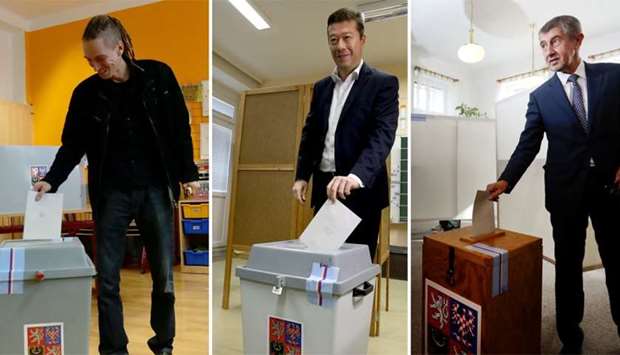* Populist ANO party of Andrej Babis seen winning most votes
* Other protest parties including far right may win seats
* ANO will need coalition partners to form government
* Babis faces police charges of fraud he denies
Czechs voted on Saturday in the final day of a parliamentary election likely to bring a billionaire businessman to power on promises to cut taxes, weed out political corruption and stand firm against immigration.
Andrej Babis's ANO party held a narrowing double-digit lead going into the vote, which started Friday and ends at 2 p.m. (1200 GMT) on Saturday.
The Central European country has enjoyed rapid growth, a balanced budget and the lowest unemployment in the European Union, but voters have grown tired of traditional political players, giving rise to Babis and other protest parties.
As many as nine parties had a chance of winning seats in the 200-member lower house, possibly complicating coalition-building for the victor.
ANO has maintained its rhetoric of opposition to the ruling system despite serving in the outgoing government along with Prime Minister Bohuslav Sobotka's centre-left Social Democrats and the centrist Christian Democrats.
Final polls gave ANO about 25-27 percent support, at least twice that of the Social Democrats in second place.
Babis has taken a tough line against further EU integration, accepting refugees and adoption of the euro, raising the prospect he may join Hungary and Poland on a collision course with the bloc.
However, he also praises EU membership and lacks the illiberal ideology seen in right-wing governments in Budapest and Warsaw.
Concerns about Babis mainly centre on his strong managerial style and vast business influence that would be amplified by him becoming prime minister as well.
Babis has stayed popular despite attacks over conflicts of interest from his food, chemical and agriculture business holdings, which were placed in a trust while in office.
He also faces police charges he illegally received a 2 million euro EU subsidy when he ran his empire, worth an estimated $4 billion, before entering politics. He has denied wrongdoing.
Political analysts give the highest chance to the current coalition continuing with ANO at the helm, or an ANO tie-up with centre-right parties. Any deal may run up against demands by potential partners that Babis personally stay out of the cabinet because of the police charges.
Many voters are also wary of Babis and his pledges to run the state with a businessman's touch.
‘His idea that you can run the state like a business is out of place. His firm belongs to him but the state does not,’ Milos Ruml, a Prague pensioner, said after voting for the Social Democrats.
ANO has won support from both right and left with pledges to boost investments into shoddy roads, turf out corrupt politicians and reject any EU-wide schemes to resettle migrants from the Middle East and Africa.
Babis's swipes at Brussels play well with eurosceptic Czechs and although immigration to the Czech Republic is virtually non-existent, fear of it has played a part in campaigning, with most parties taking a similar tough stance.
The anti-immigrant mood mirrors similar trends in neighbouring countries. Parties opposed to immigration did well in Germany's election in September and in Austria's last week.

